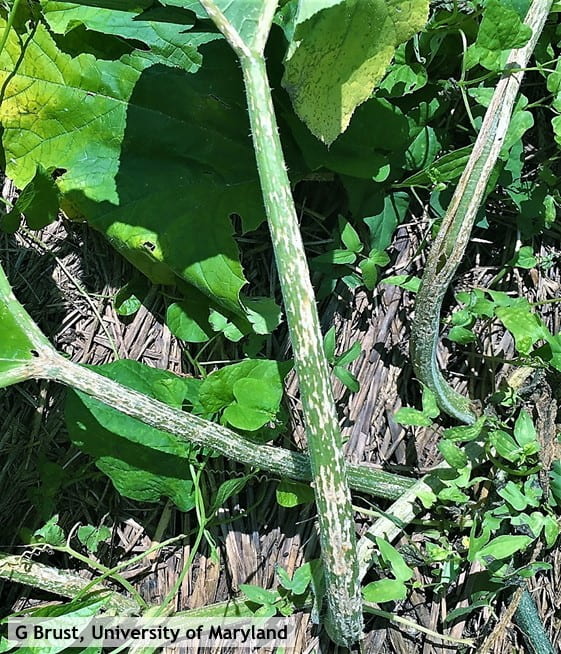Jerry Brust, IPM Vegetable Specialist, University of Maryland; jbrust@umd.edu
By this time of the season I usually see pumpkin fields infected with powdery mildew pretty commonly throughout the mid-Atlantic. And while powdery mildew is present in many pumpkin fields it does not seem as bad as in previous years. The one disease I am seeing a great deal more of this season is plectosporium blight. This fungal disease of pumpkin, zucchini and squash can cause yield loss if left uncontrolled. Plectosporium blight prefers warm, humid or rainy weather conditions. It overwinters on crop residue and can persist in the soil for several years. Plectosporium blight can be recognized from the small white to light tan spots on leaves (Fig. 1) and elongated lesions on stems and leaf petioles (Fig. 2). On green fruit the lesions are very small white to tan flecks (Fig. 3) on more mature fruit the lesions are round to irregular shaped pimples on the surface of the pumpkin making them at times unmarketable (Fig. 3). These fruit lesions also allow soft rot pathogens to penetrate into the pumpkin which will cause the fruit to ‘melt-down’ into a deflated mess. When stem and foliar lesions occur in large numbers they can give a light gray or white appearance to the foliage, vines and leaf petioles (Fig. 2). Severely infected pumpkin stems or petioles will become brittle and can split or shatter if disturbed (Fig. 2).
Figure 1. Plectosporium yellow-tan spots (lesions) on pumpkin leaf
When Plectosporium blight occurs, rotate away from summer squash and pumpkins for 2 years. Scout for disease and apply fungicides when disease first occurs. Thorough coverage of foliage, vines, and fruit is necessary for good control. Most of the time protective applications of chlorothalonil or mancozeb will give you good protection from this disease, however in years like this one where we have had frequent and heavy rains at times the disease control needs a kick with the addition to the protective sprays of using something in rotation such as Cabrio or Flint Extra or Pristine. These ‘extra sprays’ should not be rotated with one another.
Figure 2. Plectosporium lesions on pumpkin leaf petioles; the petiole to the right has split.
Figure 3. Plectosporium lesions on small green fruit and on more mature orange fruit



